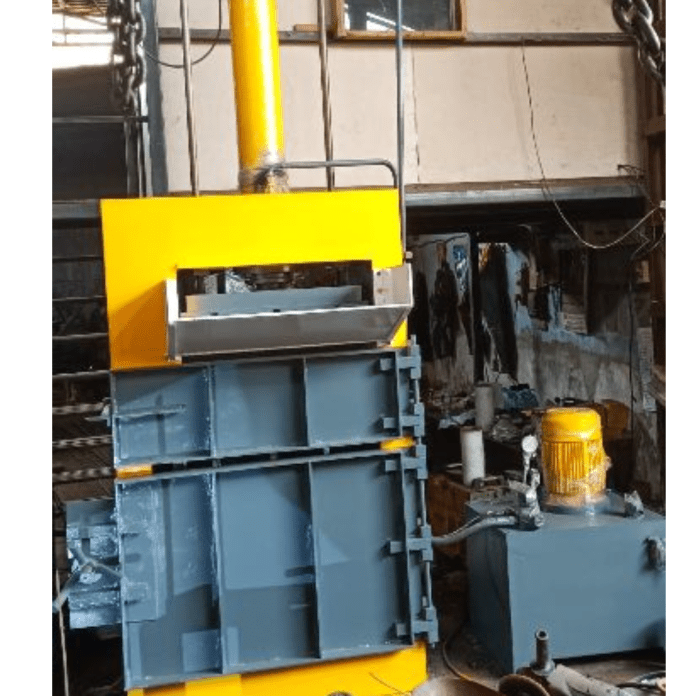Types of Baling Press Machines
Baling press machines come in several types, each designed for specific purposes. Here are some common ones:
Vertical Baling Press:
- Description: Vertical baling press machines are designed with a vertical chamber where materials are loaded from the top. They are known for their compact size and are well-suited for small to medium-scale operations.
- Applications: These machines are commonly used for baling materials like cardboard, paper, plastic, and textile waste.
- Advantages: Vertical balers are space-efficient and cost-effective for businesses with limited storage space. They are relatively easy to operate and maintain.
Horizontal Baling Press:
- Description: Horizontal baling press machines have a horizontal chamber where materials are loaded from the side. They are larger and more robust, making them suitable for larger operations.
- Applications: These machines can handle a wide range of materials, including metals, plastics, foam, and more.
- Advantages: Horizontal balers are known for their high throughput and versatility. They are ideal for businesses dealing with diverse waste materials.
Two-Ram Baling Press:
- Description: Two-ram balers are known for their efficiency and power. They have two hydraulic rams for compression and are designed to handle heavy and bulky materials.
- Applications: These machines are capable of baling materials such as scrap metal, paper, cardboard, plastics, and more.
- Advantages: Two-ram balers offer high compaction ratios, reducing the number of bales produced. They are suitable for industries generating large volumes of waste.
Applications of Baling Press Machines
Baling press machines find applications in various industries due to their versatility. Some common uses include:
- Recycling Facilities: Recycling centers rely on baling press machines to compact materials such as paper, cardboard, and plastics. These compacted bales are easier to store and transport, streamlining the recycling process.
- Manufacturing Plants: Manufacturing industries often generate excess materials during production. Baling press machines help reduce waste volume, leading to cost savings in waste disposal.
- Retail and Warehousing: Businesses involved in retail and warehousing deal with significant amounts of cardboard and packaging waste. Baling machines are used to efficiently manage and transport these materials for recycling.
- Agriculture: In the agricultural sector, baling press machines are crucial for compressing materials like hay, straw, and crop residues into manageable bales. These bales are easier to store and transport.
Advantages of Baling Press Machines
- Space-Efficiency: Baling press machines significantly reduce the volume of waste materials, leading to efficient use of storage space. This is particularly important for businesses with limited space.
- Cost Savings: By compacting materials, businesses can reduce waste disposal costs. Additionally, they may generate revenue by selling the compacted materials to recycling facilities.
- Environmental Benefits: Baling press machines contribute to waste reduction and promote recycling, aligning with sustainability goals. This reduces the environmental impact of waste disposal.
- Efficiency: These machines streamline waste management processes. They automate the compaction and baling process, reducing the labor and time required for waste handling.
- Customization: Baling press machines can be customized to accommodate specific material types, compaction ratios, and bale sizes. This flexibility allows businesses to tailor their waste management processes to their needs.
Limitations of Baling Press Machines
While baling press machines offer numerous advantages, it’s essential to acknowledge their potential limitations:
- Initial Cost: Acquiring a baling press machine can be a significant upfront investment, which may pose challenges for small businesses with limited budgets.
- Maintenance: Regular maintenance is crucial to ensure baling press machines operate efficiently. Neglecting maintenance can lead to breakdowns and increased operational costs.
- Material Limitations: Some materials, such as those with irregular shapes or extremely high moisture content, may not be suitable for baling. It’s important to assess the compatibility of materials with the chosen machine.
- Training: Operators need proper training to operate baling press machines safely and effectively. Inadequate training can lead to accidents and suboptimal performance.
When considering the purchase of a baling press machine, it’s essential to choose a reputable manufacturer and supplier. One such company worth mentioning is Balertech Industries Private Limited. Known for their quality and innovation in the field, we offer a range of baling press machines to cater to various industrial needs.
Hydraulic Baling Press Machines have become indispensable in waste management and recycling efforts across industries. They come in different types, serve diverse applications, and offer numerous advantages, although they do have some limitations. When investing in a baling press machine, considering manufacturers like Balertech Industries Private Limited ensures quality and reliability. By harnessing the power of these machines, businesses can contribute to a more sustainable and efficient future while effectively managing their waste materials.
